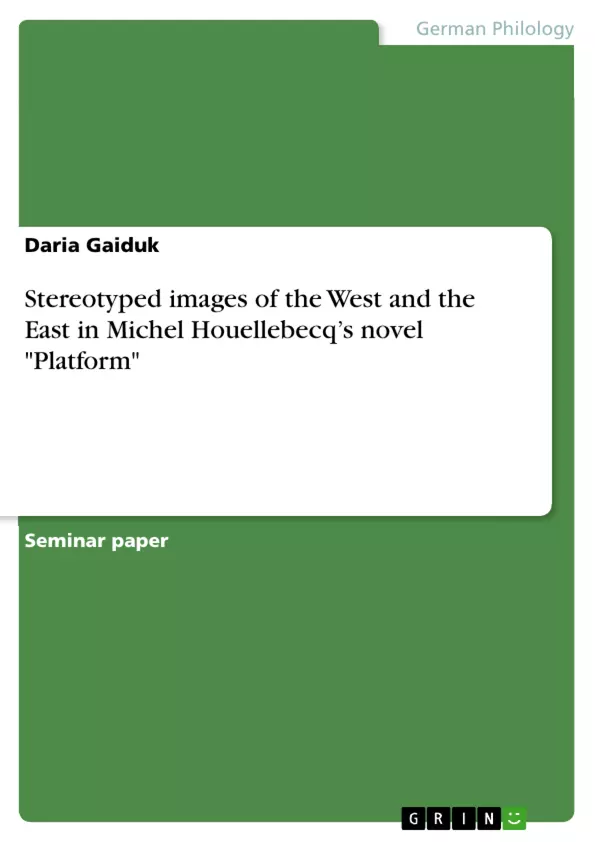Throughout the history both the Eastern and the Western parts of the world had a certain image of each other as of the opposites. The world division into ‘us’ and ‘them’ had certainly brought a number of stereotypes and prejudices. With the development of tourism, the humanity has got more opportunities to travel around the world and to discover foreign cultures. However, travelling did not eliminate all the stereotypes filling human minds. “Platform”, the second novel of controversial French author Michel Houellebecq, reveals some clichés and prejudices of modern society.
This work aims to analyse stereotyped images of the West and the East civilisations described in the novel, and to investigate the reason of their usage, as well as the impact they make on the prejudiced characters. In order to make the analysis more effective, the essay will cover the most prominent stereotypes based on the nation, gender, sexuality, and religion. In order to elaborate a clear line of analysis of the novel, which is a vivid example of postmodern literature, the essay arguments are based on the works of postmodern critical theorists writing on the Western and the Eastern civilisations (such as Jacques Derrida, Noam Chomsky, Michel Foucault, Edward Said, Homi K. Bhabha, etc.).
To make the analysis more comprehensive the essay includes the researches of psychiatrist, psychologists, psychoanalysis theorists and sociologists, as well as political scientists and communication theorists (Samuel P. Huntington, Walter Lippmann, Anthony Giddens, Gordon Allport, Sigmund Freud, Slavoj Žižek, William Cox, Patricia Devine, etc.).
Inhaltsverzeichnis (Table of Contents)
- Introduction
- The East and the West: A Historical Perspective
- Stereotypes in Michel Houellebecq's "Platform"
- National Stereotypes
- Social Status Stereotypes
- Occupational Stereotypes
- Religious Stereotypes
- The Impact of Stereotypes
Zielsetzung und Themenschwerpunkte (Objectives and Key Themes)
This essay aims to analyze the stereotypical images of Western and Eastern civilizations presented in Michel Houellebecq's novel "Platform." It investigates the reasons for the use of these stereotypes and their impact on the characters. The essay examines stereotypes based on nation, gender, sexuality, and religion, drawing on theories from postmodern critical theorists, psychiatrists, psychologists, psychoanalysts, sociologists, political scientists, and communication theorists. Key themes explored in the essay include:- The historical and cultural construction of the East-West dichotomy
- The role of stereotypes in shaping perceptions and prejudices
- The impact of stereotypes on individual and societal well-being
- The power of knowledge in challenging and overcoming stereotypes
- The contemporary relevance of the "West vs. the Rest" conflict in a globalized world
Zusammenfassung der Kapitel (Chapter Summaries)
- Introduction: The essay introduces the concept of stereotypes and their historical significance in shaping perceptions of the East and the West.
- The East and the West: A Historical Perspective: This section explores the historical development of the East-West dichotomy, examining its roots in cultural, religious, and ideological differences. It highlights the influence of colonialism and the Cold War on defining these categories.
- Stereotypes in Michel Houellebecq's "Platform": This section analyzes the various stereotypes presented in the novel, focusing on national, social status, occupational, and religious stereotypes. It demonstrates how these stereotypes are used to reinforce existing prejudices and shape characters' perceptions of one another.
- The Impact of Stereotypes: This section examines the consequences of stereotyping, exploring its impact on individuals and society. It discusses the potential for stereotypes to contribute to discrimination, prejudice, and social divisions.
Schlüsselwörter (Keywords)
This essay explores the themes of stereotypes, prejudice, East-West dichotomy, cultural identity, globalization, and the impact of social constructs on individual and societal well-being. It examines the use of stereotypes in Michel Houellebecq's novel "Platform" and utilizes the theories of prominent thinkers like Jacques Derrida, Noam Chomsky, Michel Foucault, Edward Said, Homi K. Bhabha, Samuel P. Huntington, Walter Lippmann, Anthony Giddens, Gordon Allport, Sigmund Freud, Slavoj Žižek, William Cox, and Patricia Devine.Frequently Asked Questions
What is the main focus of Michel Houellebecq’s novel "Platform"?
The novel explores clichés, prejudices, and the stereotypical images of Western and Eastern civilizations in the context of modern tourism and globalization.
How does the essay analyze the East-West dichotomy?
It uses postmodern theories from thinkers like Edward Said and Michel Foucault to examine how "us" vs. "them" perceptions are constructed.
Which types of stereotypes are investigated in the novel?
The essay covers national, social status, occupational, gender, and religious stereotypes presented through the characters.
What impact do stereotypes have on the characters?
Stereotypes reinforce prejudices, shape perceptions of foreign cultures, and can contribute to social divisions and discrimination.
Why is "Platform" considered postmodern literature?
Due to its controversial nature, its critique of grand narratives, and its focus on the fragmentation of identity in a globalized world.
- Quote paper
- Daria Gaiduk (Author), 2013, Stereotyped images of the West and the East in Michel Houellebecq’s novel "Platform", Munich, GRIN Verlag, https://www.grin.com/document/294308



